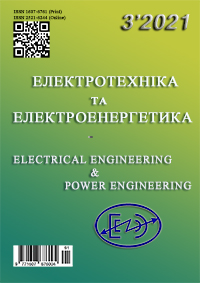Specific standards of energy consumption in the problem of controlling its use efficiency
DOI:
https://doi.org/10.15588/1607-6761-2021-3-3Keywords:
Контроль энергоэффективности, статистический метод, точность нормирования, достоверность контроляAbstract
Purpose. Analysis of the existing methods of specific energy consumption standardization and determination of the method acceptable for the standardization in conditions of transient structural and regime changes in energy consumption at a modern industrial enterprise.
Methodology. Analysis of the existing methods of specific energy consumption standardization, identification of their disadvantages and advantages. Comparison of the possibilities of these methods with the requirements for the specific energy consumption standardization in modern production.
Findings. Emphasis is focused on the significant dependence between reliability of the results of energy efficiency control of the production process (savings or overconsumption of energy) and the accuracy of the calculation of specific norms of energy consumption. The dependence between the assessments of the enterprise’s staff energy saving activity and the achieved accuracy of energy consumption standardization is determined. It is highlighted that in energy efficiency standardization practice, the existing methods are focused on the production conditions, where their benefits are fully revealed. It is proved that due to the increased accuracy of the standardization, efficiency of obtaining and processing information, the statistical method is the most acceptable for the conditions of transient structural and regime changes in the power consumption of the object. Prospects for improving the method of energy efficiency control are described.
Originality. For the first time, the use of the statistical method of specific energy consumption standardization in the system of energy efficiency control of production processes with rapid structural and regime changes in energy consumption of the object is proposed.
Practical value is to determine an acceptable method of specific energy consumption standardization in the conditions of modern industrial production, as well as ways to improve it.
References
Dubrovskij, N.A., Leshenko, P.I. (2010) Konkuren-tosposobnost produkcii i osnovnye puti ee dosti-zheniya Polotsk State University Bulletin, 4, 66-71 (in Russsian).
Shayuhov, T.T. (2016) Raschet udelnyh norm i prognozi-rovanie elektropotrebleniya na promysh-lennyh predpriyatiyah Innovative transport, 3, 8-12 (in Russsian).
Kudrin, B.I. (2002) Koncepciya elektrosberezheniya v gosudarstvennyh standartah i ee prakticheskaya re-alizuemost. Electrician, 1, 3-13 (in Russsian).
Nikiforov, G.V., Olejnikov, V.K., Zaslavec, B.I (2006) Koncepciya elektrosberezheniya v gosudarstvennyh standartah i ee prakticheskaya realizuemost. M: En-ergoizdat, 480 (in Russsian).
Pivnyak, G.G., Vypanasenko, S.I., Hovanskaya, O.I., Hatskevych, U.V., Dreshpak, N.S. (2013). Systemy enerhomenedzhmentu ta yikh matematychne zab-ezpechennia. D.: Natsionalnyi hirnychyi universytet, 214 (in Ukrainian).
Kudrin, B.I., Zhilin, B.I., Matyunin, Y.V (2013) El-ektrosnabzhenie potrebitelej i rezhimy. D: Nacional-nij girnichij univer-sitet, 412. (in Russsian).
«Pro energozberezhennya» [Elektronnij resurs]: Zakon Ukrayini [Prijnyatij postanovo Verkhovnoyi Radi Ukrayini № 75/94-ВР від 01.07.94.– Rezhim dostupu: https://zakon.rada.gov.ua/laws/show/74/94-%D0%B2%D1%80 (in Ukrainian).
Dreshpak, N.S. (2020) Sistemi kontrolyu energoefekti-vnosti virobnichih procesiv ta shlyahi yih udosko-nalennya. Electrical engineering and electrical energy, 1, 40-48 (in Ukrainian).
Nacionalne agentstvo Ukrayini z pi-tan efektivnogo vikoristannya energetichnih resursiv (2009) Metodi-ka viznachennya neracionalnogo (neefek-tivnogo) vikoristannya palivno-energetichnih resursi. Ki-yiv:GO (in Ukrainian).
Ministerstva selskogo hozyaj-stva i prodovolstviya Respubliki Belarus (2017) Metodicheskie rek-omendacii po normirovaniyu toplivno-energeticheskih resursov dlya organi-zacij sistemy: methodycheskie recomendasii. Minsk: GO (in Rus-sian).
Vypanasenko, S., Dreshpak, N. (2013) The features of energy efficiency measurement and control of production processes Energy efficiency improvement of geotechnical systems, 1, 71-78.
Vypanasenko, S., Dreshpak, N. (2015) Informational and methodological support for energy efficiency control Power Engineering, Control and Information Technologies in Geotechnical Systems, 2, 53-57.
Pothina, R., Kecojevic, V. (2007). A Gyratory Crush-er Model and Impact Parameters Related to Energy Consumption. Minerals and Metallurgical Processing, 24(3), 170-180.
Aslaksen, E. (2008) Designing complex systems. Foundations of design in the functional domain. Auerbach publications, 176.
Barrera, D., Diaz, M. (2011) Communicating systems with UML 2. Modeling and analysis of network pro-tocols. ISTE ltd, 268.
Boehm, B. (2010) A spiral model of software devel-opment and enhancement. Object management group, 180.
Adamatzky, A. (2017) Advantages in unconvention-al computing. Prototypes, Models and Algorithms. Springer International Publishing, 812.
Downloads
Published
How to Cite
Issue
Section
License
Copyright (c) 2021 Natalia Dreshpak, Oleksandr Dreshpak, Stanislav Vypanasenko

This work is licensed under a Creative Commons Attribution 4.0 International License.
Creative Commons Licensing Notifications in the Copyright Notices
Authors who publish with this journal agree to the following terms:
Authors retain copyright and grant the journal right of first publication with the work simultaneously licensed under aCreative Commons Attribution License that allows others to share the work with an acknowledgement of the work's authorship and initial publication in this journal.
Authors are able to enter into separate, additional contractual arrangements for the non-exclusive distribution of the journal's published version of the work (e.g., post it to an institutional repository or publish it in a book), with an acknowledgement of its initial publication in this journal.
Authors are permitted and encouraged to post their work online (e.g., in institutional repositories or on their website) prior to and during the submission process, as it can lead to productive exchanges, as well as earlier and greater citation of published work.

